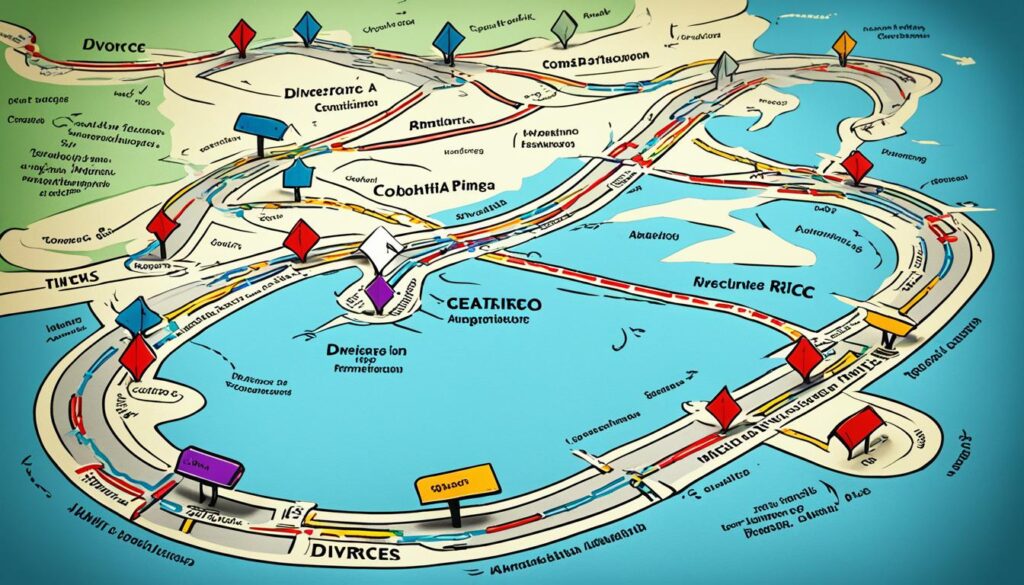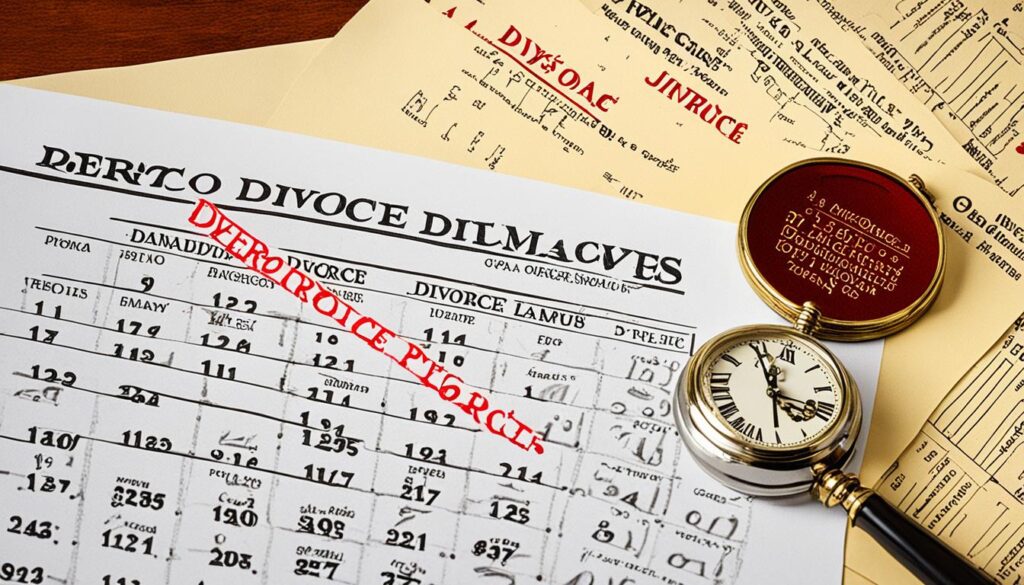

Obtaining a divorce in Puerto Rico involves familiarizing yourself with the legal regulations pertaining to the process. Whether you are contemplating mutual consent divorce or facing an irretrievable breakdown, there are particular prerequisites and steps to adhere to. This article will provide you with the necessary details regarding Puerto Rico’s divorce laws.
To file for divorce in Puerto Rico, at least one party must meet certain residency requirements. According to Puerto Rico divorce laws, at least one party must have lived in Puerto Rico for one year. This residency requirement applies regardless of where the marriage took place. However, there are exceptions to this rule.
If the grounds for divorce occurred in Puerto Rico, the residency requirement is waived. This means that if the reason for the divorce happened within Puerto Rico, such as one of the parties committing adultery or abuse in Puerto Rico, then residency is not mandatory.
Another exception is if one of the parties already resides in Puerto Rico. In this case, the residency requirement is also waived, regardless of how long the other party has lived in Puerto Rico.
Additionally, if one of the parties to be divorced is a minor who has married and been emancipated, they can make the decision to divorce without parental authorization.
It is important to note that meeting the residency requirement is essential for filing for divorce in Puerto Rico. Failure to meet this requirement may result in the dismissal of the divorce petition.
AdvertisementDivorce in Puerto Rico can be obtained through a court hearing or by public deed before a notary. Each option has its own requirements and process. Couples seeking a divorce must carefully consider their situation and choose the most suitable option.
Divorce by mutual consent is a popular option for couples who can agree on the terms of their divorce. With this approach, both parties work together to create a settlement agreement that addresses various aspects of the divorce, such as asset division, debt allocation, child custody, child support, and visitation rights.
If you and your spouse are considering a divorce by mutual consent, it is essential to document all agreements in writing and have them notarized. This ensures that the terms of the divorce are legally binding. To complete the process, the couple must file the settlement agreement with the court and obtain a final decree of divorce.
In cases where there is no possibility of reconciliation, couples can seek a divorce based on irretrievable breakdown. This ground for divorce recognizes that the marriage has experienced significant and irreversible difficulties, leading to its breakdown.
AdvertisementTo pursue a divorce by irretrievable breakdown, the parties must state in their divorce petition that there are irreconcilable differences causing the marriage to be beyond repair. This ground does not require extensive evidence or a specific fault on either party’s part. Once the court receives the petition, it can proceed with the divorce without requiring a hearing in certain cases.

Both divorce options have their advantages and considerations. Couples should seek legal advice to determine which option aligns best with their circumstances and goals. Consulting an experienced attorney can help ensure a smooth and fair divorce process.
| Aspect | Divorce by Mutual Consent | Divorce by Irretrievable Breakdown |
|---|---|---|
| Agreement | The couple must agree on all terms of the divorce and document them in a settlement agreement. | The focus is on stating irreparable differences, with less emphasis on reaching agreements on specific terms. |
| Process | The couple must file the settlement agreement with the court and obtain a final decree of divorce. | The court may grant the divorce without requiring a hearing in certain cases. |
| Time | The process may take longer as it involves negotiating and finalizing the settlement agreement. | The divorce can be finalized relatively quickly, depending on court procedures and caseload. |
Individuals who wish to represent themselves in divorce proceedings can visit the Pro Se Centers of the Judicial Branch in Puerto Rico. These centers provide general information and guidance but are not a substitute for legal counsel. While self-representation is allowed, it is advisable to seek legal counsel to fully understand the legal consequences and navigate the process effectively.
| Advantages of Self-Representation | Considerations for Self-Representation |
|---|---|
| 1. Cost-effective | 1. Lack of legal expertise |
| 2. Greater control over the case | 2. Potentially complex legal procedures |
| 3. Flexibility in managing the timeline | 3. Emotional stress and bias |
“Representing oneself in a divorce case can be a viable option for those on a tight budget or who prefer to have more control over their case. However, it is crucial to recognize the potential drawbacks, such as navigating complex legal procedures and facing emotional stress without professional guidance.”
While Pro Se Centers can provide valuable resources, it’s important to remember that they do not provide legal representation. The centers can assist individuals in understanding court forms, procedures, and relevant legal resources. They can also provide general information about divorce laws in Puerto Rico. However, they cannot advise on specific legal strategies or adequately address complex legal issues. Therefore, it is highly recommended that individuals consult with an attorney for personalized legal advice and representation.

Remember, representing oneself in a divorce case is a significant responsibility that requires careful preparation and understanding of the legal process. While it may be tempting to save on legal fees, it’s important to weigh the potential risks and challenges. Seeking the guidance of an experienced divorce attorney can help protect one’s rights, ensure a fair outcome, and minimize unnecessary stress during this difficult time.
When considering a divorce in Puerto Rico, it is important to understand the financial implications involved. The cost of getting divorced can vary depending on the grounds for divorce and the specific circumstances of the case.
If you are filing an individual petition for divorce based on irretrievable breakdown, you can expect to incur a fee of $90.00 in internal revenue stamps. However, if both parties are filing a joint petition on the grounds of irretrievable breakdown or mutual consent, the fee is reduced to $78.00 in internal revenue stamps.
AdvertisementIn addition to the filing fees, there may be other expenses that arise during the divorce proceedings. These can include attorney fees, court costs, and any additional services or resources required to facilitate the legal process.
One of the major expenses to consider is the cost of legal representation. Hiring an attorney to guide you through the divorce process can help ensure that your rights and interests are protected. The specific fees charged by attorneys can vary depending on their experience, expertise, and the complexity of the case. It is important to discuss fees and payment arrangements with your attorney upfront to avoid any surprises.
In addition to attorney fees, there may be various court costs associated with your divorce proceedings. These costs can include filing fees, fees for serving legal documents, and fees for any necessary court appearances. The exact amount of these costs can vary depending on the specific requirements of your case and the court in which your divorce is being heard.
| Expense | Cost |
|---|---|
| Individual petition for divorce on the grounds of irretrievable breakdown | $90.00 in internal revenue stamps |
| Joint petition for divorce on the grounds of irretrievable breakdown or mutual consent | $78.00 in internal revenue stamps |
| Attorney fees | Varies depending on the attorney and complexity of the case |
| Court costs | Varies depending on the specific requirements of the case and court |

It is important to carefully consider the financial aspects of divorce before proceeding. By understanding the costs involved, you can make informed decisions and plan accordingly.
The respondent in a divorce case plays a crucial role in the proceedings. It is essential for the respondent to understand their obligations to ensure a fair and just resolution. Failure to fulfill these obligations can have significant consequences. Let’s explore the respondent’s role, the importance of filing an answer, the concept of default judgment, and the potential outcomes of not responding to a divorce petition.
When served with a divorce petition, the respondent has 30 days to file an answer. Filing an answer is a fundamental requirement that allows the respondent to present their side of the story and address the claims made by the petitioner. It is an opportunity to assert their rights, concerns, and desired outcomes related to the divorce. Responding within the given timeframe demonstrates active participation and cooperation in the legal process.
AdvertisementIf the respondent fails to file an answer within the specified timeframe and does not request an extension, the petitioner may move the court to enter a default judgment against the respondent. A default judgment is a legal ruling made in favor of the petitioner due to the respondent’s failure to respond. It means that the divorce proceedings can proceed without the respondent actively participating.
When a default judgment is entered, the court may base its decision solely on the claims made by the petitioner in the divorce petition. This can result in the court granting the requested relief without considering the respondent’s perspective or interests. For example, custody, support, property division, and other key issues may be decided without the respondent’s input.

It is crucial for the respondent to be proactive and diligently follow the legal requirements by filing an answer within the given timeframe. This ensures their interests are properly represented and protects their rights throughout the divorce proceedings.
| Respondent’s Actions | Consequences |
|---|---|
| Files an answer within the given timeframe | Open and fair consideration of their perspective, interests, and desired outcomes |
| Fails to file an answer within the given timeframe | Default judgment may be entered against the respondent, leading to potential loss of control over the divorce proceedings |
The divorce process in Puerto Rico can have varying timelines depending on the specific grounds for divorce and the court’s schedule. However, in general, a divorce typically takes effect 30 calendar days after the judgment is served, unless the parties involved waive this waiting period. It is important to note that this waiting period allows for a potential reconciliation or a cooling-off period before the divorce becomes final.
If the divorce is obtained through a public deed, it becomes final and unappealable upon execution by the parties involved. This means that once the divorce is executed and the necessary documentation is completed, the divorce is considered legally binding and cannot be challenged or reversed later on.
The waiting period and the effectiveness of the divorce decree serve as important safeguards to ensure that both parties have sufficient time to consider their decision and finalize any necessary arrangements related to the divorce, such as property division, child custody, and support.
Advertisement
In Puerto Rico, a divorce decree can only be set aside if it is challenged and fraud is proven to have been intentionally committed. This applies to divorces obtained either through the court or by public deed. However, divorces obtained by public deed cannot be set aside. It is important for individuals seeking to challenge a divorce decree to provide evidence of fraud and demonstrate that it was intentionally committed.
Challenging a divorce decree requires gathering substantial evidence and presenting a compelling case to the court. The burden of proof lies with the party seeking to set aside the decree, and it must be shown that the fraud had a significant impact on the divorce proceedings. It is advisable to consult with an experienced attorney who specializes in family law to guide you through this complex process and ensure that your rights are protected.
In Puerto Rico, couples seeking divorce have the option of pursuing a divorce by mutual consent. This type of divorce requires both parties to come to an agreement on various stipulations that will govern the dissolution of their marriage. These stipulations cover important matters such as assets, debts, parental rights, support, visitation, and the division of property.
By negotiating and including these stipulations in the divorce agreement, the parties can ensure that their rights and the best interests of their children are protected throughout the process. The court will carefully review these stipulations during the divorce hearing to ensure that they are fair and voluntary.
Divorce by mutual consent offers couples an opportunity to work together and reach an amicable resolution, minimizing conflicts and simplifying the divorce process. It allows them to have greater control over the outcome of their divorce, giving them the power to shape their own future.
“Divorce by mutual consent gives couples the chance to collaborate and establish the terms of their divorce together. It allows them to maintain a level of control and make decisions that will better serve their unique situation.”
During the divorce proceedings, the court will consider the stipulations and ensure that they meet legal requirements and are not unfairly biased towards one party. If any issues or concerns arise, the court may intervene to address them and ensure a fair resolution.
AdvertisementChoosing divorce by mutual consent can offer a more peaceful and efficient alternative to traditional divorce proceedings. By working together and prioritizing cooperation, couples can find common ground and resolve their differences in a mutually beneficial manner.

Navigating divorce laws in Puerto Rico requires careful consideration of residency requirements, procedural steps, and the various options available for obtaining a divorce. Whether through court hearings or public deed before a notary, understanding the requirements, costs, and timelines associated with divorce proceedings is essential.
It is advisable to seek legal counsel or utilize the Pro Se Centers provided by the Judicial Branch of Puerto Rico for guidance throughout the divorce process. These resources can offer general information and assistance, but it is important to remember that they are not a substitute for professional legal advice.
Recent updates in Puerto Rico family law have aimed to protect victims of domestic violence and promote joint custody arrangements. It is imperative to stay informed about these developments. The Puerto Rico Bar Association and the Puerto Rico Family Court website are valuable resources for additional information and support with regards to divorce laws in Puerto Rico.
To file for divorce in Puerto Rico, at least one party must have lived continuously and uninterruptedly in Puerto Rico for one year. This requirement applies regardless of where the marriage took place. However, the requirement is waived if the grounds for divorce occurred in Puerto Rico or if one of the parties resides in Puerto Rico.
Divorce in Puerto Rico can be obtained through a court hearing or by public deed before a notary. The two types of proceedings are divorce by mutual consent and divorce by irretrievable breakdown.
AdvertisementYes, self-representation is allowed in Puerto Rico divorce proceedings. Individuals can visit the Pro Se Centers of the Judicial Branch in Puerto Rico for general information and guidance. However, it is advisable to seek legal counsel to fully understand the legal consequences and navigate the process effectively.
The cost of getting divorced in Puerto Rico depends on the grounds for divorce. Filing an individual petition for divorce on the grounds of irretrievable breakdown incurs a fee of $90.00 in internal revenue stamps. Additional expenses may arise during the divorce proceedings, such as attorney fees and court costs.
If the respondent fails to file an answer within 30 days and does not request an extension, the petitioner may move the court to enter a default judgment against the respondent. The divorce proceedings may proceed without the respondent, and the judgment may be rendered based on the petitioner’s claims.
The timelines for divorce proceedings in Puerto Rico vary and depend on the grounds for divorce and the court’s docket. Generally, a divorce takes effect 30 calendar days after the judgment is served, unless the parties waive this waiting period.
A divorce decree in Puerto Rico can only be set aside if it is challenged and fraud is shown to have been intentionally committed. This applies to divorces obtained either through the court or by public deed. Divorces by public deed, however, cannot be set aside.
AdvertisementIn a divorce by mutual consent, the parties must negotiate and include stipulations concerning assets, debts, custody, support, visitation, and division of property. These stipulations are reviewed by the court during the hearing to ensure they are fair and voluntary.
When it comes to navigating divorce in Dominican Republic and Puerto Rico, there are some similarities in the legal process. Both countries require a period of separation before filing for divorce, and both have specific requirements for property division and child custody. However, it’s important to consult with legal experts in each country to understand the specific differences.

Amazon

Legal Strategies for Everyone: The Complete Guide to Covering your Assets, Maximizing Wealthy, and Protecting Your Family (Strategies for Everyone, 2)
Amazon

Amazon

Sarah’s voice is one of the first you’ll encounter at How Get Divorce, and it’s one you’ll come to trust. As a writer, she brings relatability and approachability to complex topics, making them understandable for everyone. As our Community Moderator, Sarah fosters a welcoming and supportive environment, encouraging open dialogue and connection among our members. Her ability to relate to others and moderate discussions makes her an integral part of our team and community.